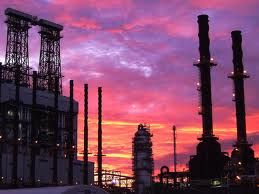
Canadian Natural Resources Ltd. (CNQ), the country’s worst-performing major energy stock this year, is sitting on its shale-gas reserves until the price rebounds rather than joining the race to export the fuel to Asia.
“We’ll continue to be patient and when gas prices come back, then we’ll be prudent and develop the gas assets,” Steve Laut, president of the Calgary-based company, said in a telephone interview on Aug. 9. Developing a liquefied natural gas export terminal is “not an option” because the company favors more spending on oil production, Laut said.
Canadian Natural is the second-largest landholder in British Columbia’s Montney gas region, which holds an estimated 49 trillion feet of gas near the Pacific Coast. Encana Corp. (ECA) and Royal Dutch Shell Plc lead companies proposing at least eight LNG projects to export the gas to Asian buyers who are paying as much as nine times the domestic price, which is near decade lows.
Backing an LNG terminal doesn’t make sense as Canadian Natural has “enough projects” on its plate, including an expansion of its Horizon oil-sands project north of Fort McMurray, Alberta, Laut said. Costs tied to the expansion, about 755 kilometers (470 miles) northeast of Calgary, account for 23 percent of Canadian Natural’s 2012 budget while gas spending in North America makes up 8 percent.
The company, Canada’s second-largest natural gas producer, has cut the number of wells it plans to drill this year to 35 from 71 and is reducing North American gas spending to C$515 million ($519 million) from a May 3 target of C$625 million after second-quarter net income fell 19 percent.
LNG Race
Encana, Canada’s largest gas producer, is planning an LNG project with partners Apache Corp. (APA) and EOG Resources Inc. (EOG), both headquartered in Houston, Texas, using its Montney and Horn River assets to attract the higher prices Asian countries are willing to pay.
Canadian Natural, with 262,000 hectares (647,416 acres) in the Montney region, is the only major gas producer that has excluded the option of building or operating an LNG export plant as a way to capture higher prices. Progress Energy Resources Corp. (PRQ), subject of a C$5.16 billion takeover bid by Petroliam Nasional Bhd, is the biggest stakeholder in the Montney.
Canadian Natural shares dropped 21 percent this year through yesterday, the most among Canada’s largest fossil-fuel producers with a market value of more than C$10 billion, and more than the 3.5 percent decline for the S&P/TSX Energy Index (STENRS) over the same period. Canadian Natural rose 1.4 percent to C$22.30 at 9:58 a.m. in Toronto.
Arbitrage Strategy
The share decline is “far more than its oil-oriented peers,” Thomas Driscoll, a New York-based research analyst with Barclays Plc investment bank unit, wrote in a note to clients on Aug. 10. Encana gained 16 percent this year through yesterday, while Apache has declined 2.9 percent and Shell is down 5.1 percent.
By not buying into an LNG export project, Canadian Natural may be foregoing an opportunity to sell its gas at the premiums that competitors pursuing the arbitrage strategy are banking on, said Bill Gwozd, senior vice president of gas services at Calgary-based gas advisory company Ziff Energy Group.
Asian buyers of LNG currently pay oil-linked prices, which averaged $16.62 per million British thermal units of gas during the first quarter. After paying for liquefaction and transportation to Pacific Rim markets, Canadian LNG projects could offer profits of $6 to $7 per million Btu, said Gwozd.
Decade Low
Canada could be a “super-player” in a global LNG market poised to grow to 50 billion cubic feet per day by 2020, from the current 30 billion, said Gwozd. “Price is the No. 1 upside,” he said in a phone interview.
“Leaders such as Shell, Apache, Encana, EOG, have seen the light, have seen the true potential,” Gwozd said. “If they can lock up the long-term contracts and manage the contract costs, they think the upside here is significant.”
Gas futures in New York touched a 10-year low of $1.902 per million British thermal units in April, and averaged $2.50 per million Btu in the first quarter, settling at $2.77 per million Btu on Aug. 10. Spot gas prices at Canada’s AECO hub, which trade at a discount to U.S. Henry Hub prices, hit a low of $1.52 per million Btu in April and closed at $2.28 per million Btu on Aug. 10.
To counter low commodity prices, Canadian Natural is shifting spending to oil from gas, Laut said. The company operates its Horizon bitumen mining plant in Alberta’s oil-sands region.
Cost Creep
An LNG project would be a time-consuming, complicated and expensive “distraction” for Canadian Natural, which has more expertise as an producer or driller of gas rather than as an integrated player which refines fuel, Timothy Parker, portfolio manager for natural resource strategies at T. Rowe Price International Inc., said in a phone interview from Baltimore.
“There’s every chance these LNG projects are going to be more expensive than you think,” said Parker, who oversees about $6.5 billion at T. Rowe Price and owns Canadian Natural shares. “LNG projects are extremely expensive. History would tell you that prices rebound over time.”
At the same time, the economics for heavy oil “have been strong” and are poised to get stronger, Laut said on an Aug. 9 conference call with analysts.
Unlike other producers reliant on gas production, Canadian Natural can develop its oil and leave gas in the ground while North American gas prices are low, said Peter Howard, president of the Calgary-based Canadian Energy Research Institute.
“Canadian Natural wants to pour all their money into the oil-sands operations, which right now and for the foreseeable future, have a good-looking financial picture,” Howard said.
Source: Bloomberg
We use cookies to improve your experience. By continuing to use our site, you accept our Cookies, Privacy Policy,Terms and Conditions. Close X